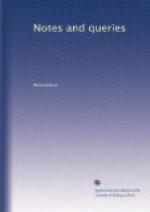The singular error which Messrs. Lye and Thorpe have fallen in the passage pointed out by Mr. Hampson in Aelfric’s very interesting Colloquy, is the more remarkable as Aelfric himself afforded a complete illustration of the passage, in his Glossary, where we have “BULGA, hydig-faet.” It is possible, therefore, that higdifatu is a mere error of the scribe. Now Du Cange, v. Bulga, cites this very passage from Aelfric’s Glossary, and adds, “i.e. vas ex corio confectum,” but his whole article is worth consulting. That the Latin word in the Colloquy should be Cassidilia is quite clear. Thus in an old MS. English Gloss on the Bible (penes me), the passage in Tobit, viii. 2., “Protulit de Cassidili suo,” is rendered, “brouzt forth of his Scrippe.” Coverdale has it, “take out of his bagge,” and Luther, “langte aus seinem Suecklein,” which word is exchanged for buedel in the Saxon version. In two old Teutonic Glosses on the Bible published by Graff (Diutiska, ii. 178.), we have the following variations:—
de cassidi burssa, de sacello t. sacciperio kiula de cassili burissa, de sacello t. sacciperio kiulla.
Another Gloss in Graff’s 1st vol. p. 192., on the word Cadus, may perhaps throw some light on the subject. The philological student need not be reminded of the wide application of the word vas, Lat., fazz, O.G., and faet. A.S.; but for my own part, I conclude that the shoewright intended to designate by higdifatu all sorts of leathern budgets. Every Anglo-Saxon student must be so sensible of the great obligation he is under to our distinguished scholar Mr. Thorpe, that I trust it will not be deemed invidious or ungracious to point out another passage in this Colloquy which seems to have hitherto baffled him, but which it appears to me may be elucidated.
To the question, “Hwilce fixas gefehst thu?” the fisherman answers, “Aelas aud hacodas, mynas, aud aelputan, sceotan aud lampredan, aud swa hwylce swa on waetere swymath, sprote.”
Mr. Thorpe, in the 1st edition of his Analecta, says, “What is intended to be meant by this word [sprote], as well as by salu [the correspondent word in the Latin], I am at a loss to conjecture.” In his second edition, Mr. Thorpe repeats, “I am unable to explain salu otherwise than by supposing it may be an error for salice. In his Glossary he has “spro’t, ii. 2.? sprout, rod?” with a reference to his note. I must confess I cannot see how the substitution of salice for salu would make the passage more intelligible, and the explanation of spro’te in the Glossary does not help us. The sense required appears to me to be, quickly, swiftly, and this will, I think, be found to be the meaning of sprote.




